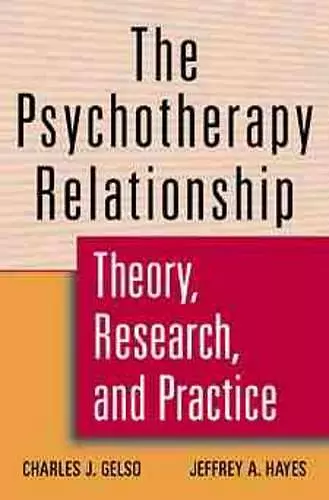The Psychotherapy Relationship
Theory, Research, and Practice
Charles J Gelso author Jeffrey A Hayes author
Format:Hardback
Publisher:John Wiley & Sons Inc
Published:15th Sep '98
Currently unavailable, and unfortunately no date known when it will be back

Human beings are social creatures, and from the moment we enter the world, our personal horizons are defined by our relationships with others. Parents, siblings, teachers, friends, lovers, colleagues-even the countless strangers with whom we interact during the course of any given day-we exist through them and they through us. This book is concerned with one of the most profound, yet difficult to define of human relationships, the healing relationship of psychotherapy.
There are many psychotherapeutic schools of thought, and while they may vary considerably in theory and methodology, virtually all agree that the relationship that develops between therapist and client is important to the success of treatment. But how do you define a "successful" client/therapist relationship? How exactly does the psychotherapy relationship influence process and outcome? What are its various components, and which are most important to the healing process? In this groundbreaking study, Charles Gelso and Jeffrey Hayes provide answers to these and other challenging questions about The Psychotherapy Relationship.
The authors begin by defining the three main components of the psychotherapy relationship: the working alliance, transference configuration, and the real relationship. They then consider how each is generally defined by and functions within various psychotherapeutic approaches, how each interrelates with the other two components within the context of the therapy relationship, and how relationship components and therapeutic techniques interact during treatment. Throughout, the authors draw upon their extensive clinical experience to offer advice and guidance on how to avoid and overcome major obstacles to a successful psychotherapy relationship.
The remainder of the book is devoted to a fascinating in-depth look at the psychotherapy relationship in action in four major psychotherapy schools: psychoanalytic, cognitive/behavioral, humanistic, and feminist. Ever mindful of important factional differences within schools of thought, the authors explore the role of the relationship within each approach in terms of the centrality of the relationship; whether the relationship is seen as a means to an end or an end in itself; the extent to which the emphasis is on the "real" relationship versus the transference; and the manner in which the therapist uses power in the relationship.
The most penetrating and far-ranging exploration yet of this most crucial aspect of...
ISBN: 9780471127208
Dimensions: 242mm x 162mm x 25mm
Weight: 699g
304 pages